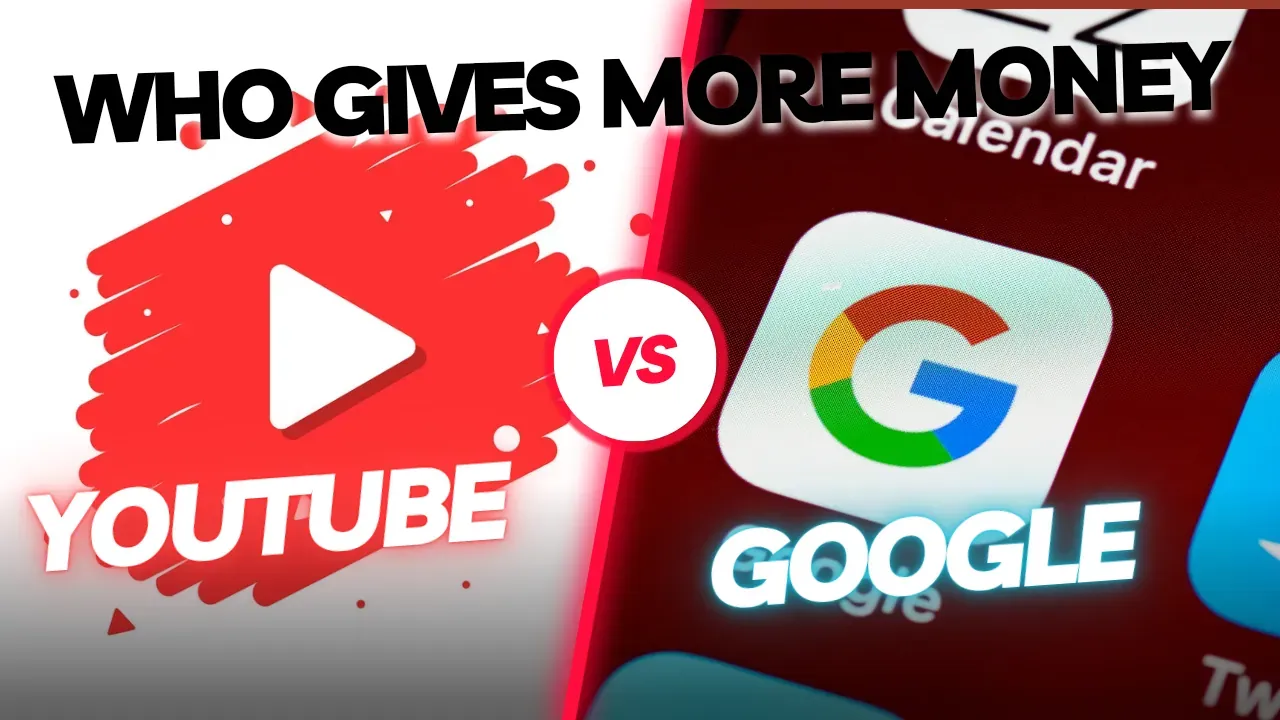YouTube vs Website Earnings who is the best?
YouTube vs website for earning money
In today's digital age, there are numerous ways to earn money online. Two popular methods are creating content on YouTube and creating a website. Both platforms have the potential to generate significant revenue, but there are pros and cons to each. In this article, we will explore the differences between YouTube and websites for earning money.
YouTube
YouTube is the world's largest video-sharing platform, with over 2 billion monthly active users. YouTube has become an attractive platform for content creators, and it's not hard to see why. YouTube offers a vast potential audience, a low barrier to entry, and monetization opportunities.
Creating a YouTube channel is straightforward. All you need is a Google account, and you can start uploading videos. Once you've established a channel with a decent following, you can start monetizing your content. YouTube allows creators to earn money through advertising revenue, sponsorships, merchandise sales, and fan funding.
YouTube's advertising revenue is based on a cost-per-impression (CPM) system. This means that creators earn money based on the number of views and clicks on their ads. The CPM can vary depending on the industry, region, and other factors. For instance, tech and gaming content typically have a higher CPM than beauty and lifestyle content.
Sponsorships are another way to earn money on YouTube. Creators can work with brands and promote their products in their videos. This is typically more lucrative than advertising revenue, but it requires a significant following and engagement rate.
Merchandise sales are also an option for creators with a loyal fanbase. YouTube offers a merchandise shelf feature, which allows creators to sell their products directly from their channel. This can include anything from t-shirts to phone cases.
Fan funding is another way to earn money on YouTube. This feature allows fans to support their favorite creators through donations. Creators can set up a PayPal account or use YouTube's Super Chat feature to receive donations during live streams.
Websites
Creating a website is another way to earn money online. Websites can be used to sell products, offer services, or provide information. The revenue streams for websites are similar to those for YouTube, but the methods of monetization can vary.
E-commerce is a popular way to earn money on websites. Creators can sell physical or digital products through their site. This can include anything from clothing to e-books.
Affiliate marketing is another way to earn money on websites. Creators can promote other people's products and earn a commission on sales. This requires a significant following and a strong relationship with your audience.
Advertising revenue is also an option for websites. Creators can place ads on their site and earn money based on clicks or impressions. The revenue potential for advertising on websites is typically lower than on YouTube.
Membership or subscription services are another way to earn money on websites. Creators can offer exclusive content, services, or products to paying members. This is similar to Patreon, a popular platform for creators to offer exclusive content to their fans.
Which is Better for Earning Money: YouTube or Websites?
There's no clear answer to this question. Both platforms have the potential to generate significant revenue, but the methods of monetization can vary. It's worth noting that YouTube has a larger potential audience, but the revenue potential for advertising on websites is typically lower.
For creators who are comfortable on camera, YouTube can be a great platform to build a following and earn money through advertising revenue and sponsorships. For creators who prefer to write or provide services, creating a website can be a great option. Websites offer more control over monetization and can be used to sell products or offer exclusive services.
Ultimately, the best platform for earning money will depend on your skills, audience, and goals. Some creators may even choose to use both platforms to maximize their revenue potential.
Factors to Consider
While both YouTube and websites offer monetization opportunities, there are other factors to consider when choosing which platform to use. These include:
Time Investment
Creating content for YouTube can be time-consuming, as videos require planning, filming, editing, and promoting. On the other hand, creating a website can be time-consuming in terms of design, development, and maintenance. Consider how much time you're willing to invest in creating content and managing your platform.
Technical Skills
YouTube requires some technical skills, such as filming and editing videos, while creating a website requires technical skills such as coding, web design, and maintenance. Consider your level of technical expertise when choosing a platform.
Audience Engagement
YouTube offers a more interactive experience, as viewers can leave comments and interact with creators. Websites can also offer an interactive experience, but it's typically less immediate. Consider which platform will allow you to best engage with your audience.
Branding
YouTube has a built-in audience, but it can be challenging to stand out among the crowd. Creating a website allows you to develop a unique brand and build a website that reflects your personality and style. Consider which platform will allow you to best express your brand.
Long-term Goals
Consider your long-term goals when choosing a platform. If you plan to build a career as a content creator, YouTube may be a better option as it offers more exposure and opportunities for monetization. If you plan to build a business, a website may be a better option as it offers more control over monetization and branding.
Conclusion
Both YouTube and websites offer opportunities to earn money online, and the best platform will depend on your skills, audience, and goals. YouTube offers a vast potential audience and monetization opportunities, but it can be time-consuming and competitive. Websites offer more control over branding and monetization, but they require technical skills and time investment.
Ultimately, the decision to use YouTube or a website should be based on your strengths and interests. Consider your skills, audience, and goals, and choose the platform that aligns with your vision. Remember that both platforms can be used together to maximize your revenue potential and reach a broader audience
Last word
In this post we will provided information about YouTube vs Website Earnings who is the best?, If you enjoy this post, kindly share it with your friends. For any queries, feel free to join our Telegram channel, where we share exclusive and informative content. Many valuable tips are exclusively available on our Telegram channel. Stay updated with your favorite source, DK Technozone.





![PUBG Mobile Lite config Ultra Aimbot auto headshot: Latest Update [100% Working]](https://blogger.googleusercontent.com/img/b/R29vZ2xl/AVvXsEhBIxYwXISNcJn0UpDTG0Rg__RYya6j6wgoAfI1V5DMcd9E1uPzYjiJwpvkrjbMa41dpv1zh3VN0bmZ63yisgSuGroWDaIcPS5SbS0iJlworQsR7yEdaZWeOrfrryqf2vo1twZwUp9NE5LYGeCuYs1rPDMW3jGnHbrfd6jKAvmq31sOvK1eT2-Db_S1VrY/s16000/1000113727.webp)






